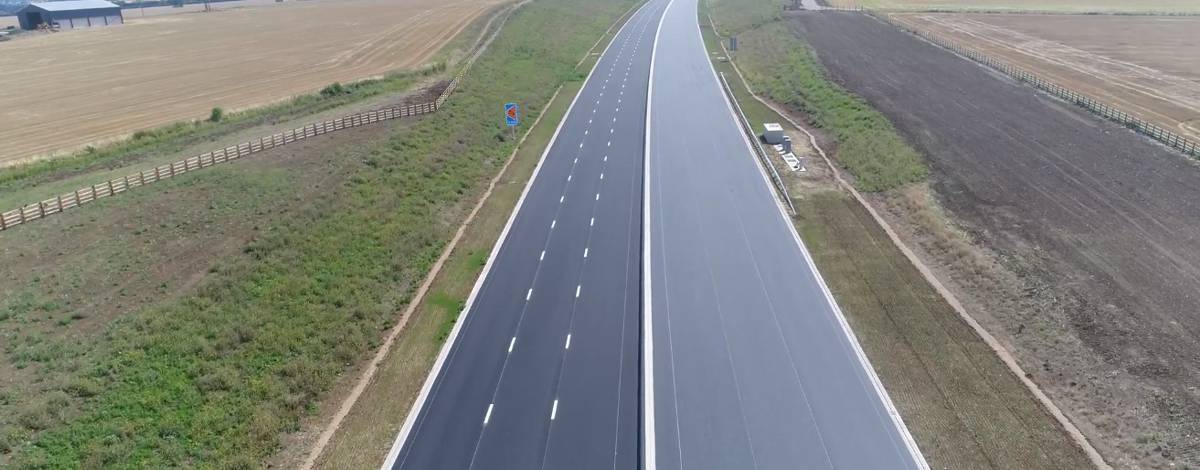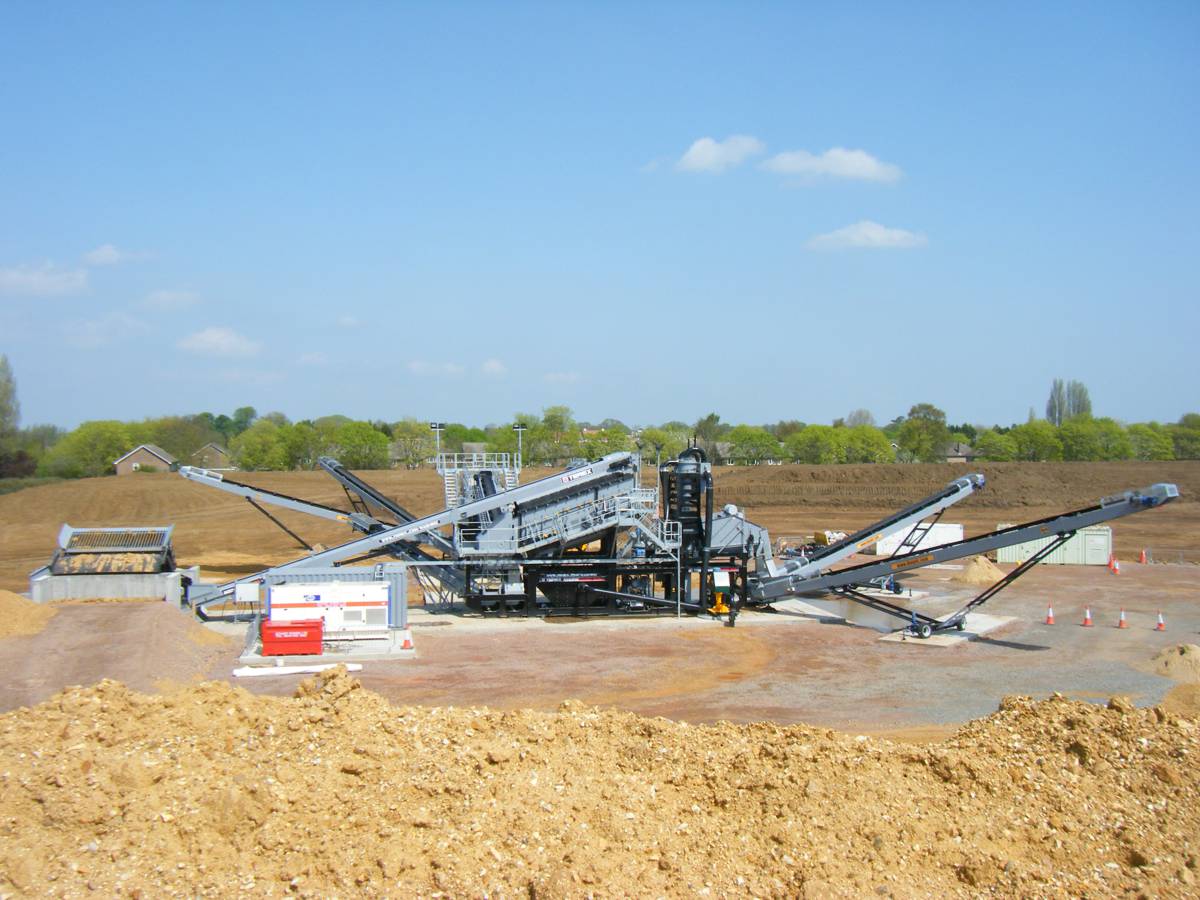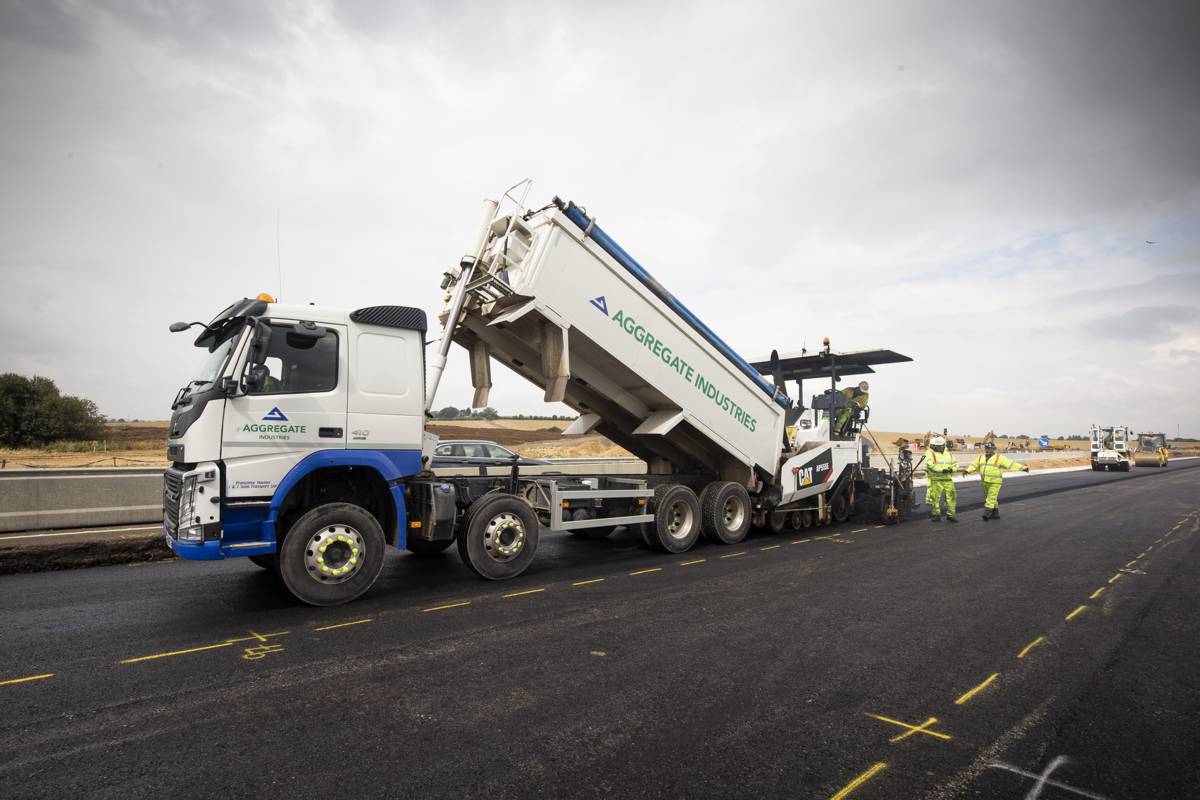A14 upgrade shows the Road to Infrastructure Success
Opening eight months ahead of schedule amid a global pandemic, Highways England’s new A14 Cambridge to Huntingdon improvement scheme – their largest road improvement project to date – is a magnificent example of Britain’s road-building prowess, says Paddy Murphy, Managing Director of Aggregate Industries’ Contracting Division.
As the sole pavement contractor to work on this prestigious scheme, Paddy examined how close collaboration, innovative materials and stringent health and safety practices proved vital in creating the A14’s world class road network.
It took 14,000 people approximately 14 million construction hours – the equivalent of almost 1,600 years – to the build the 21-mile stretch of the A14 Cambridge to Huntingdon improvement scheme.

The £1.5 billion project – one of the UK’s largest infrastructure schemes – opened for traffic on 5th May, on budget, eight months ahead of schedule and in the middle of the global coronavirus pandemic which had brought the nation to a standstill since March.
Now largely complete, the upgrade is delivering faster, easier journeys for those travelling between Cambridge and Huntingdon, shaving up to 20 minutes off journeys and vastly improving access to and from the UK’s largest container port at Felixstowe.
What is the secret to a successful project on this scale?
For this particular scheme, efficient and successful delivery can be attributed partly to three core values which were instilled from the onset and through every stage of construction; contractor and supply chain collaboration, innovative supply and specification of materials, as well as health, safety and environmental best practices.
Let’s examine each of these in more detail on the A14 Cambridge to Huntingdon improvement scheme to see what learnings can be made going forwards.

Integrated delivery
One of the key success factors of this scheme was the forming of the A14 Integrated Delivery Team (IDT), a joint venture between Balfour Beatty, Costain and Skanska, design consultants Atkins and CH2M and client Highways England.
The IDT brought together six management teams, each with responsibility for an individual section of the scheme, into a single, highly effective delivery model.
With 1.6 million square metres of road to be constructed and surfaced, together with 10 kilometres of non-motorised user pathways to create, procurement and supply chain management would be fundamental to this. In total, more than £250 million of supply chain contracts were procured by the IDT across labour, demolition, earthworks and pavement works packages, using an award-winning assessment approach.
The assessment took into account price (40%), quality (40%) and behavioural elements (20%) which were assessed over a two-day process of observation to check the ability of potential suppliers to work collaboratively with other suppliers and contractors. The IDT wanted to ensure that all suppliers would be able to fit into the fully integrated team structure, placing an emphasis on successful project delivery over individual company objectives.
Following a 12-month process of Early Contractor Involvement (ECI), Aggregate Industries was awarded the pavement construction works packages across all six sections of the A14 improvement scheme; working collaboratively with the IDT, other providers and supply chain throughout the entire project.
Our team fully engaged with collaborative planning including weekly programme meetings to minimise conflict between activities and manage contract risk. We also worked closely with the IDT Lean team, embracing the use of collaborative management tools including Touchplan, a cloud-based lean planning tool and ANDON, a new app-based works efficiency management tool.
Additionally, we worked in partnership with the IDT on materials testing, maximising resources to prevent any risk of delays when testing composite pavement material and asphalt.
These measures and a united commitment to collaborative working practices from all parties contributed towards a more flexible programme with improved response times, maximum safety and enhanced efficiency across the project.

Technology and Innovation
Another aspect to the successful delivery of this project was Aggregate Industries ability to identify alternative flexible composite pavement designs and surfacing options that supported Highways England’s requirements. This not only benefited the road user, by utilising localised aggregate sources, on site haulage and laying the pavement through Titan pavers but also gained significant efficiencies in time, cost and carbon.
For example, to mitigate excessive noise pollution created by high traffic volumes in built up residential areas and satisfy environmental requirements specified on the project, Aggregate Industries suggested the use of its 10mm SuperThin asphalt. This ground-breaking solution, which at -7.8db(A) by far exceeds the minimum noise reduction requirements, rather than the -3.5db(A) achieved by traditional thin surface course systems.
As the only supplier on the market to currently offer a HAPAS-approved ultra-low noise asphalt, Aggregate Industries laid more than 34,000 tonnes of SuperThin across the A14 contract, covering in excess of 25% of the new carriageway with one of the quietest surface courses available.
However, innovation for Aggregate Industries does not just apply to the materials used in delivering successful infrastructure projects – it also shapes the way in which we supply those materials.
The contract included supply of 740,000 tonnes of asphalt for road surfacing and more than 550,000 tonnes of low-carbon cement bound granular mixture (CBGM) for the pavement works, a flexible composite alternative chosen in place of cementitious reinforced concrete pavement (CRCP).
To supply all of this in the most efficient and environmentally friendly way possible, Aggregate Industries used three mobile continuous batching plants for the CBGM, as well as a purpose-built, £3.5 million temporary asphalt plant established on-site in Godmanchester.
Both supply methods played a crucial role in minimising the carbon footprint of the scheme, drastically reducing the number of vehicle movements required on the strategic road network. In addition, Aggregate Industries transported the aggregate used in its asphalt mixes by rail, further reducing its environmental impact.

Health, Safety & Environmental Best Practice
Of course, no major construction project can be delivered without a key focus on health and safety. However, this particular scheme went above the required standard to embed a safety culture that was supported from the very top by all participating contractors.
At Aggregate Industries, their approach and commitment to health and safety helped to ensure more than 4 million working hours were completed on this project without a single lost time incident. In total, 230 of our personnel were involved in the scheme across contracting, aggregates, asphalt, cementitious and wagon drivers.
Risks were managed, such as 100,000 on-site vehicle movements delivering material to the Titan pavers and to carry out additional risk assessments introducing new working practices to minimise and control the risk posed by COVID-19.
This commitment was in line with overall project standards set by the IDT, helping to ensure exemplary standards, a safer, more productive working environment and minimal disruption due to safety issues.

Driving Ahead with Success
Given the sheer size and complexity of the project, the A14 Cambridge to Huntingdon improvement scheme has set the gold standard on what the UK construction industry can achieve working with government organisations such as Highways England in creating a world-class road network.
The success of this iconic project can be attributed to trailblazing practices in several areas that have created the blueprint for successful infrastructure schemes going forward. Collaboration, innovation and health and safety were all key contributors in delivering a successful scheme on time and on budget. If you are looking for a great demonstration of how numerous elements came together to undertake a large-scale infrastructure project successfully, there is no better example than the A14 Cambridge to Huntingdon improvement scheme.















